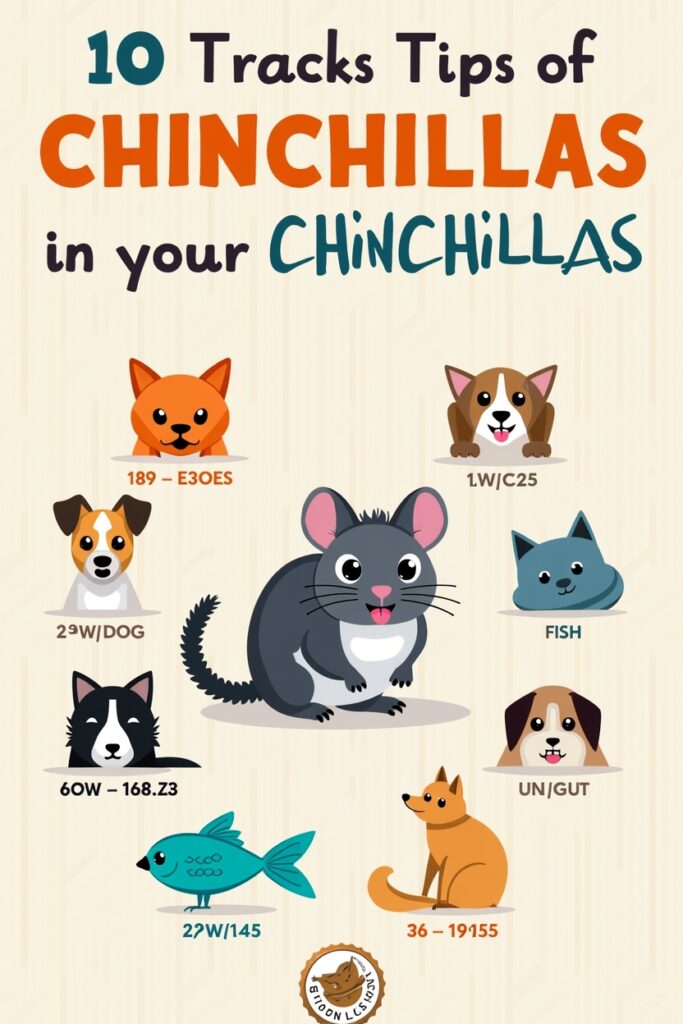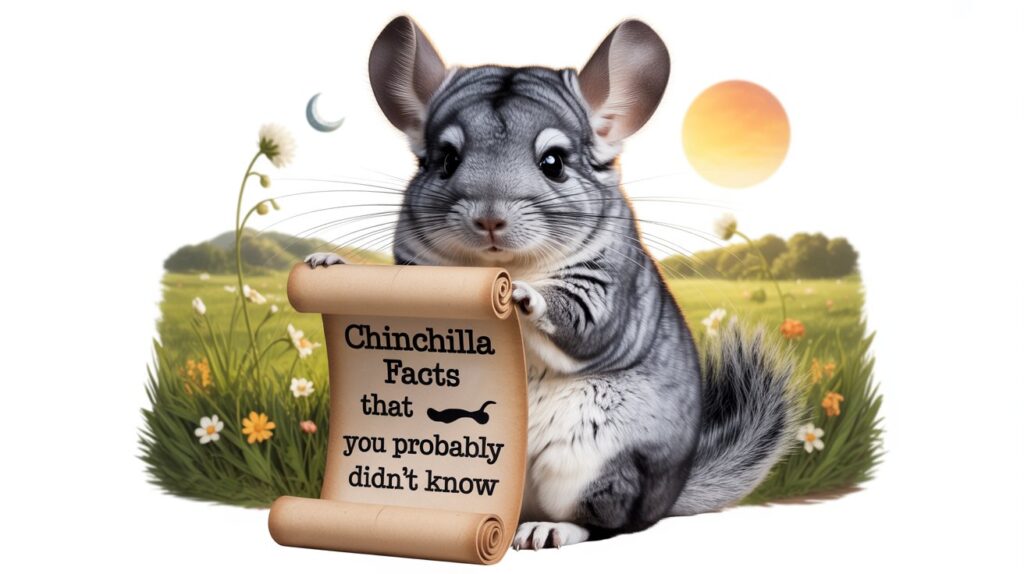Introduction
If you are thinking about keeping a chinchilla as a pet, one of the first questions that comes to mind is, “How long do chinchillas live as pets?” Knowing their lifespan is very important because owning a chinchilla is a long commitment. Chinchillas are not like hamsters or mice that live only a few years. With the right care, these soft and adorable animals can stay with you for more than a decade.
In this guide, we will talk about the average lifespan of chinchillas, what affects how long they live, and how you can help your pet live a long, happy life.
Table of Contents
Average Lifespan of Chinchillas
Chinchillas are known for living longer than many other small pets.
In the wild: Chinchillas usually live for about 8 to 10 years. The reason is that wild chinchillas face predators, harsh weather, and limited food.
As pets: Chinchillas live much longer in captivity. With good care, they can live 12 to 20 years. Some even reach up to 22 years, which is amazing compared to other rodents.
So, when people ask, “How long do chinchillas live as pets?” the simple answer is: they live about 15 years on average, but they can live even longer with proper care.

Why Do Chinchillas Live Longer as Pets?
Chinchillas survive longer in homes than in the wild because:
Safe environment – No predators to hunt them.
Consistent food supply – Balanced diet every day.
Veterinary care – Treatment for sickness.
Controlled living space – Protection from extreme weather.
This shows that chinchillas, when cared for properly, enjoy a much safer and healthier life indoors.
Factors That Affect Chinchilla Lifespan
Even though chinchillas can live long lives, their lifespan depends on many factors. Let’s look at the most important ones:
1. Diet and Nutrition
Food is the biggest factor in chinchilla health. A balanced diet should include:
Timothy hay – Main food for digestion and dental health.
High-quality pellets – Extra nutrients.
Fresh water – Always available.
Limited treats – Dried rose hips, oats, or small pieces of apple.
Avoid giving them foods high in sugar or fat, as these can shorten their life.
2. Housing and Environment
Chinchillas need a large, safe, and clean cage. Their environment affects how long they live.
Cage size: Big enough for climbing and playing.
Temperature: Between 60°F–70°F. Chinchillas overheat easily.
Bedding: Dust-free and clean.
Chew toys: To keep teeth healthy.
A stressful or unsafe cage can harm your pet’s health.
3. Exercise and Activity
Chinchillas are active pets that need exercise. A wheel (solid surface, not wire) and safe playtime outside the cage help them stay healthy. Exercise prevents obesity, which can cause health problems.
4. Genetics
Just like humans, genetics play a role. Some chinchillas naturally live longer due to strong genes. If they come from healthy parents, they often live longer lives.
5. Veterinary Care
Regular vet visits help catch health problems early. A chinchilla that gets medical care when needed will usually live longer than one that does not.
How to Help Your Chinchilla Live Longer
If you want your chinchilla to live a long life, here are simple care tips:
Feed a balanced diet – Mostly hay, some pellets, and occasional safe treats.
Provide a cool environment – Never expose them to heat.
Give dust baths – 2–3 times a week to keep their fur clean.
Avoid loud noises – Stress can shorten their life.
Keep cage clean – Wash water bottles, food bowls, and bedding regularly.
Offer chew toys – To prevent overgrown teeth.
Handle gently – They are delicate animals.
When you follow these steps, your chinchilla has a higher chance of living 15–20 years.

Chinchilla Lifespan Compared to Other Pets
Let’s compare chinchillas with other popular small pets:
Hamster: 2–3 years
Guinea pig: 5–7 years
Rabbit: 8–12 years
Chinchilla: 12–20 years
As you can see, chinchillas live much longer than most other small pets. That means when you adopt one, you must be ready for a long-term commitment.
Common Health Problems That Shorten Lifespan
Sadly, some health problems can shorten a chinchilla’s life. Knowing them helps you prevent issues.
Dental disease – Teeth grow nonstop, so they need hay and chew toys.
Heatstroke – Chinchillas cannot survive in hot temperatures.
Digestive issues – Caused by wrong food or sudden diet changes.
Respiratory infections – From dusty or dirty cages.
Stress-related illness – Loud sounds or rough handling can harm them.
Regular care and vet checkups can stop most of these problems.
Do Male or Female Chinchillas Live Longer?
There is no big difference between male and female chinchilla lifespans. Both can live up to 20 years with proper care. However, females that breed often may face health issues, so pet owners should be careful if they decide to breed them.
Can Chinchillas Really Live 20 Years?
Yes! There are many reports of chinchillas living 18–22 years in captivity. These are usually chinchillas that receive excellent care, live in stress-free homes, and have good genetics.
Final Thoughts
So, how long do chinchillas live as pets? The answer is that they usually live 12–20 years, which is much longer than most other small animals. Their lifespan depends on diet, environment, exercise, and regular vet care.
Chinchillas are amazing pets, but they also require commitment. If you are ready to provide love, patience, and proper care, your chinchilla may stay by your side for almost two decades. That is a beautiful journey for both the pet and the owner.
FAQs About Chinchilla Lifespan
1. How long do chinchillas live in captivity?
They usually live between 12 and 20 years in captivity.
2. Do chinchillas live longer in the wild or as pets?
They live longer as pets because they are safe from predators and get regular food and care.
3. Can chinchillas live more than 20 years?
Yes, some chinchillas live up to 22 years with excellent care.
4. What foods help chinchillas live longer?
Timothy hay, quality pellets, and safe treats like dried rose hips support a long life.
5. Do chinchillas need vet checkups?
Yes, regular checkups help prevent and treat health problems early.
6. Are chinchillas good pets for kids?
They need gentle handling, so older kids with supervision can care for them.
7. Do male or female chinchillas live longer?
Both live about the same lifespan, but breeding females may face extra health risks.
8. What shortens a chinchilla’s life?
Poor diet, overheating, stress, and lack of vet care.
9. How do I know if my chinchilla is healthy?
Signs of good health include bright eyes, clean fur, active behavior, and normal eating.
10. Is owning a chinchilla a long-term responsibility?
Yes, because they can live 15–20 years, adopting one means a long commitment.


